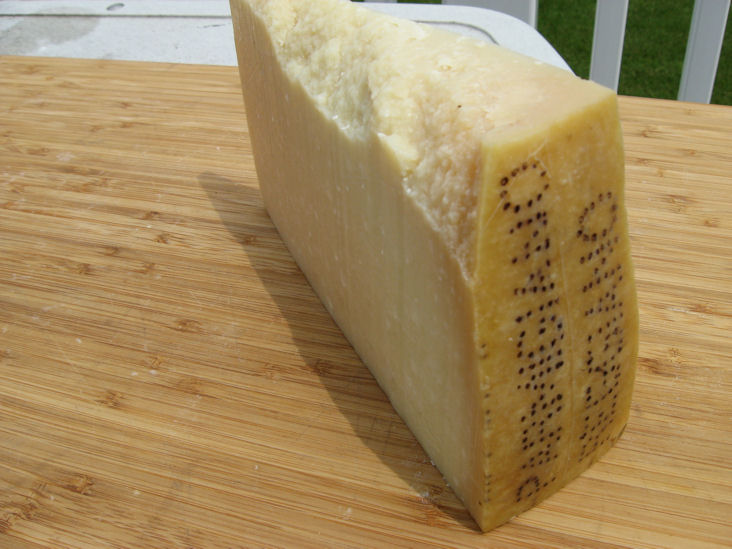If I were forced to describe myself to an interrogator my first instinct would be to blurt out “Cheesehead!” I actually picture myself as one of the fans at a Green Bay Packers game wearing – not a wedge of Wisconsin cheese – but a wedge of the almighty Parmesan! TV chef Mario Batali likes to call it “the indisputable king of cheeses.” Right now as we speak there are about 15 varieties of cheese in my refrigerator deli drawer – no exaggeration. The biggest hunk, though, is the revered Parmigiano Reggiano.
In case you were wondering, there is no cheese produced in the U.S. that is anywhere close to the product made in Italy’s Emilia Romagna region, one of the principal cities of which is the town of Parma. Unfortunately the U.S. regulatory scheme imposed on American consumers is rigged to give off the impression that Wisconsin cheeses with Italian-style names and labels are in fact the real thing. Make no mistake, they are not.
I speak of the Food and Drug Administration, which over the years has bent over to the wishes of the Wisconsin producers who want to label their products as “Parmesan” or “Romano” or whatever. FDA has no problem with cheese nomenclature as long as safety is assured. Great. All Wisconsin cheeses are safe, but what exactly is being sprinkled on your spaghetti from the green can labeled “Parmesan”?
Getting to the point, when you go to the supermarket and reach for the Kraft green can labeled as Parmesan, you are getting anything but. I hope this message spreads around and starts people thinking!!
If you have time to kill, get on line and check out the availabe information on authentic Parmesan. Wikipedia is one good source, as always. There you’ll find that the real thing is aged for a minimum of 12 months, or else it can’t be labeled with the magic words stenciled on the rind: “Parmiggiano Reggiano.” In Europe, that is. The better product is aged 24 months. Both have what is called “DOP” status, which means they are certified by the local authorities as the genuine item.
Here at home the FDA has caved in to the mega-producers Here we encounter “parmesan” wannabe’s that have been aged for only 10 months – the Stella brand is one example – and contain enzymes as well as cellulose. Cellulose! Wood fiber! Should we say – sawdust!!! To make it worse, back in 2002 FDA issued a letter to a producer saying that it was ok to label its product as parmesan even though it was aged only 6 months. The letter says, and I quote, “FDA will refrain from taking any regulatory action.” Wow! Go ahead and label the stuff as aged 6 months we will not arrest you! So, no surprise, the Kraft specimen shown below is in fact aged only 6 months.
I can foresee that eventually FDA will allow a “parmesan” label to be slapped on any product that has been sitting around in the factory for a couple of days. The claim is that the cellulose is supposed to prevent “caking.” So, ok, dump the cellulose on board in whatever amount, since the labels aren’t required to tell you how much is in there. The Kraft label says there are no fillers. Really?? What do you think the cellulose is doing beside preventing “caking?” Hey, when you come down to it cellulose is ok for human consumption, it even promotes regularity.
Here’s an idea. Why not eliminate the cheese altogether and market just the cellulose with a healthy dose of salt?
Not to beat up on Kraft Foods. They are just doing what the regulations allow. Wisconsin also should not be unfairly singled out. There are dozens of ersatz parmesan purveyors around the U.S. some of whom actually have Italian connections in the family tree. Stella Brand is one example.
Now I know the real thing goes for around 15 dollars per pound on average. But if your’re setting up for a dinner party, or would simply like to treat yourself once in a while, the cost will be more than justified. However if you’re just doing the Wednesday night spaghetti and meatball dinner for the kids, don’t reach for the green can. Just grate some good quality New York or Vermont sharp white cheddar for the table. If you insist on a parmesan look-alike I suggest the Bel Gioioso brand of Asiago cheese. Hey it’s even from Wisconsin!
So to recapitulate this is what you use in your recipes:
And this is ok for fertilizing your tomato plants:
Got that off my chest. Feel much better now.


